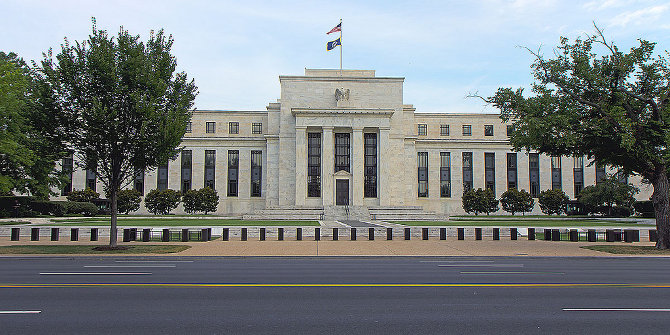In a survey of European and US economists, 86% believe that the UK economy is likely to be at least several percentage points smaller in 2030 than it would otherwise have been. Only a quarter of respondents believe the same applies to the EU-27 economy, while 41% don’t consider that the impact on the EU will be strongly negative, writes Romesh Vaitilingam.
The UK’s exit from the European Union (EU) was finally completed on 1 January 2021, nearly five years after the Brexit referendum of 2016. We invited our European and US panels to express their views by agreeing or disagreeing (and how strongly and with what degree of confidence) with statements related to the likely long-term effects on both the UK economy and the aggregate economy of the remaining 27 EU members.
Of our 48 European experts, 44 participated in this survey; of our 43 US experts, 39 participated – for a total of 83 expert reactions.
Statement 1. The UK economy is likely to be at least several percentage points smaller in 2030 than it would have been if the country had remained in the European Union.
On this first statement, a strong majority (86% of the panellists) agrees that the UK economy is likely to be at least several percentage points smaller in 2030 than it otherwise would have been.
Weighted by each expert’s confidence in their response, 49% of the European panel strongly agree, 41% agree, 8% are uncertain, and 3% disagree (the totals don’t always sum to 100 because of rounding). Among the US panel (again weighted by each expert’s confidence in their response), 12% strongly agree, 67% agree, 21% are uncertain, and 0% disagree.
Overall, across both panels, 35% strongly agree, 51% agree, 13% are uncertain, and 2% disagree.
More nuances in the experts’ views come through in the short comments that they are able to include when they participate in the survey. Among those who strongly agree, Thierry Mayer at Sciences-Po notes: ‘This is one of the topics where quantified evidence has accumulated over the recent years, pointing to large welfare losses.’ Richard Portes at London Business School says: ‘There are many studies, both official sector (e.g., Office for Budget Responsibility) and academic (e.g., the Centre for Economic Performance at the London School of Economics, LSE). Consensus range is 4-6%.’
Several panellists refer to the channels by which a negative impact is likely to occur. John Van Reenen at the LSE states: ‘All serious Brexit analysis shows a significant hit to the UK because of higher trade costs with its nearest neighbour.’ Peter Neary at Oxford explains: ‘Leaving the single market and customs unions imposes non-tariff trade barriers that will impact negatively on trade volumes.’
Daniel Sturm at the LSE comments: ‘There are many channels but more border frictions, less trade and therefore less growth is the most direct one.’ Christopher Pissarides also at the LSE notes: ‘Because of trade barriers and much less collaboration in research and trade agreements with third parties.’ Christian Leuz at Chicago adds: ‘For UK, multiple channels at play: trade, migration and human capital, and foreign direct investment.’
Some panellists point to effects that have already happened. Judith Chevalier at Yale mentions: ‘Effects on investment and productivity have already been measurable.’ John Vickers at Oxford concurs: ‘Substantial negative effects on investment and productivity already since the referendum.’ And Nicholas Bloom at Stanford says: ‘Brexit has reduced UK trade in services and migration. Both were driving growth and now both have been reduced.’
A number of panellists provide links to analysis of Brexit effects, including official reports from the Bank of England, HM Government, and the Office for Budget Responsibility, as well as independent research by some of the panellists themselves – Nicholas Bloom and colleagues on the impact of Brexit on UK firms; Peter Neary and colleagues on trade elasticities and geographical distance in the context of Brexit; and John Van Reenen and colleagues on the costs of Brexit compared with Covid-19, and the consequences for UK trade and living standards.
Among the panellists who say they are uncertain; several mention the role of future UK policy choices in determining the overall growth outcome. For example, Jose Scheinkman at Columbia observes: ‘While impact is most likely negative, magnitude is still very uncertain and will depend on UK’s future policy choices.’
Jordi Gali at Barcelona adds: ‘It will depend on the quality (in the sense of growth-oriented) policies it undertakes from now.’ Aaron Edlin at Berkeley says: ‘We don’t know yet what trade agreements will replace it.’ And Jan Pieter Krahnen at Goethe University Frankfurt explains: ‘It all depends on the extent to which the UK will pursue a beggar-thy-neighbour policy, basically free-riding or arbitraging on the EU.’
Daron Acemoglu at MIT, who agrees with the statement, is pessimistic about the likely policy choices: ‘That’s my median expectation. Not because of direct effect of less trade but because of worse policies that will result from Brexit politics.’ But Robert Hall at Stanford, who says he is uncertain, is one of several panellists doubtful about how far forward we can look: ‘This is an incredibly complicated issue with forces going in both directions. Pretence to expertise would be misplaced.’
Statement 2. The aggregate economy of the 27 countries still in the EU is likely to be at least several percentage points smaller in 2030 than if the UK had not left.
On the second statement about the potential impact on the aggregate EU-27 economy by the end of the decade relative to the counterfactual of the UK having remained, views are more divided. Nearly a quarter of respondents agree that the EU-27 economy will be at least several percentage points smaller in 2030 than it otherwise would have been. But more than a third say they are uncertain, while 41% disagree that the impact will be that strongly negative.
Again, there are notable differences between the two panels’ views. Of the European panel (again weighted by each expert’s confidence in their response), 12% strongly agree, 14% agree, 28% are uncertain, 38% disagree and 9% strongly disagree. Members of the US panel are more uncertain, fewer disagree, and none say that they agree or disagree strongly: 20% agree, 48% are uncertain, and 31% disagree.
Overall, across both panels, 7% strongly agree, 16% agree, 36% are uncertain, 35% disagree, and 6% strongly disagree.
Among those who agree or strongly agree, there are concerns about the impact of the loss of the UK’s voice in EU policy-making. Nicholas Bloom argues: ‘The UK was a free market voice in the EU before Brexit. Without the UK, the EU will be more protectionist.’ Lubos Pastor at Chicago shares this view: ‘After Brexit, EU will miss Britain’s strong voice favouring market solutions and economic efficiency.’ And Jan Pieter Krahnen says: ‘UK’s EU membership produced positive externalities, concerning goods and services, but also with regard to the broader policy decisions taken.’
Of the panellists who say they are uncertain, Kjetil Storesletten at Oslo comments: ‘EU will suffer from Brexit although less than the UK. Reason: EU is much larger than the UK.’ Daniel Sturm says: ‘Less trade with the UK is not enough of a negative shock for the EU and may be compensated by firms relocating from the UK to the EU.’ And Richard Thaler at Chicago asks: ‘How much of the London financial sector moves to the continent?’
Among those who disagree, several mention the different sizes of the UK and EU economies. Franklin Allen at Imperial notes: ‘UK not a very large part of the total EU so difficult to believe there will be that large an effect.’ Patrick Honohan at Trinity College Dublin agrees: ‘Some areas will be affected, but aggregate impact likely to be less than “several percentage points”.’ And Maurice Obstfeld at Berkeley says: ‘The EU27 will suffer far less than the UK… a much smaller proportion of their foreign trade is at stake.’
Others who disagree note nevertheless that some parts of the EU might be hit harder than others. Beata Javorcik at Oxford says: ‘The impact on EU countries (other than Ireland) will be much smaller than the impact on the UK.’ John Van Reenen adds: ‘EU needs UK less than UK needs EU. There is bigger hit to some countries (e.g., Ireland) but not so much in aggregate.’ And Peter Neary concludes: ‘Some countries will be negatively affected (e.g., Ireland, Netherlands, Denmark) but larger and more Eastern ones are unlikely to suffer much.’
♣♣♣
Notes:
- All comments made by the experts are in the full survey results here: US panel and EU panel.
- This blog post expresses the views of its author(s), not the position of LSE Business Review or the London School of Economics.
- Featured image by Wolfgang Hasselmann on Unsplash
- When you leave a comment, you’re agreeing to our Comment Policy






Dear Romesh,
Thank you for the above insight. Would it be in any way possible to reflect on the past 5 year’s economic figures of the UK and the impact that Brexit has (influenced by the corona virus obvioulsly for 2020 &2021)?
Thank you